Dhanvantari information, facts, significance, importance, mantra | What is Dhanvantari famous for? | Who was the first doctor Dhanvantari? | Which avatar of Vishnu is Dhanvantari?
Namaste friends, how are you doing today? Welcome to #BhagavanBhakthi website / blog.
Bhagavan Lord Sri Krishna (Vishnu) (Rama) (Trivikrama) (Dhanvantari) and Goddess Sri Rukmini Devi (Goddess Sri Lakshmi Devi) blessings to you and your family!
In this website / blog, you will always learn about #Hinduism #Sanskrit language.
Also subscribe to my YouTube channel from this link #BhagavanBhakthi to view videos about #Hinduism #Sanskrit language.
Just before moving towards to know about “Dhanvantari information, facts, significance, importance, mantra | What is Dhanvantari famous for? | Who was the first doctor Dhanvantari? | Which avatar of Vishnu is Dhanvantari?“, let us know a brief, basic and very important information.
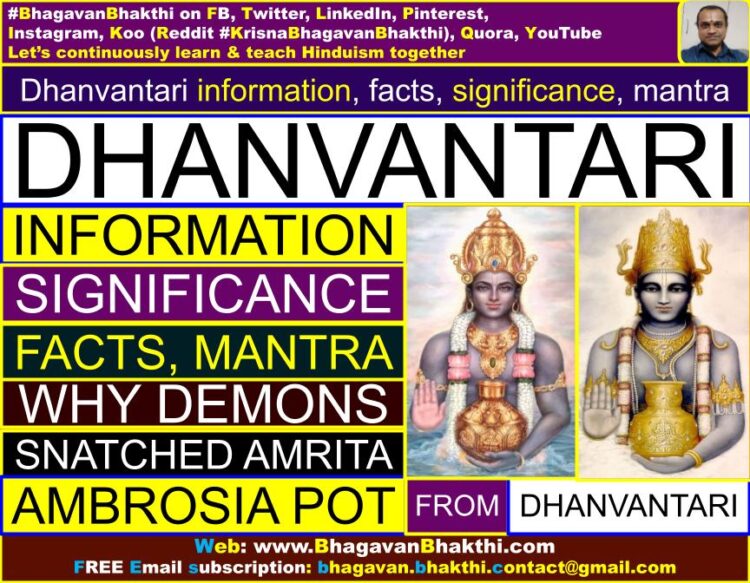
Bhagavan Lord Sri Dhanvantari is an avatar of Bhagavan Lord Sri Vishnu and he is the physician or doctor of the unlimited universes (ananta brahmanda). Bhagavan Lord Sri Dhanvantari has been the king of Varanasi (Kashi) earlier as per Hindu Texts.
Bhagavan Lord Dhanvantari is mentioned in the Puranas as the ‘God of Ayurvedic Science’. Sri Dhanvantari, during the Samudra manthan came out of the ‘Kshira Sagaram’ (Ocean of divine Milk) with the nectar of immortality in his hands
In every household of India, it is an usual practice to pray to Lord Dhanvantari and seek his blessings for sound health for themselves, their family members, relatives, friends and overall to all the well-wishers.
This praying is done especially on Dhanteras or ‘Dhanvantari Trayodashi’ (It is the day when Bhagavan Lord Sri Vishnu took the avatar of Lord Sri Dhanvantari). This is celebrated as the “National Ayurveda Day” in India.
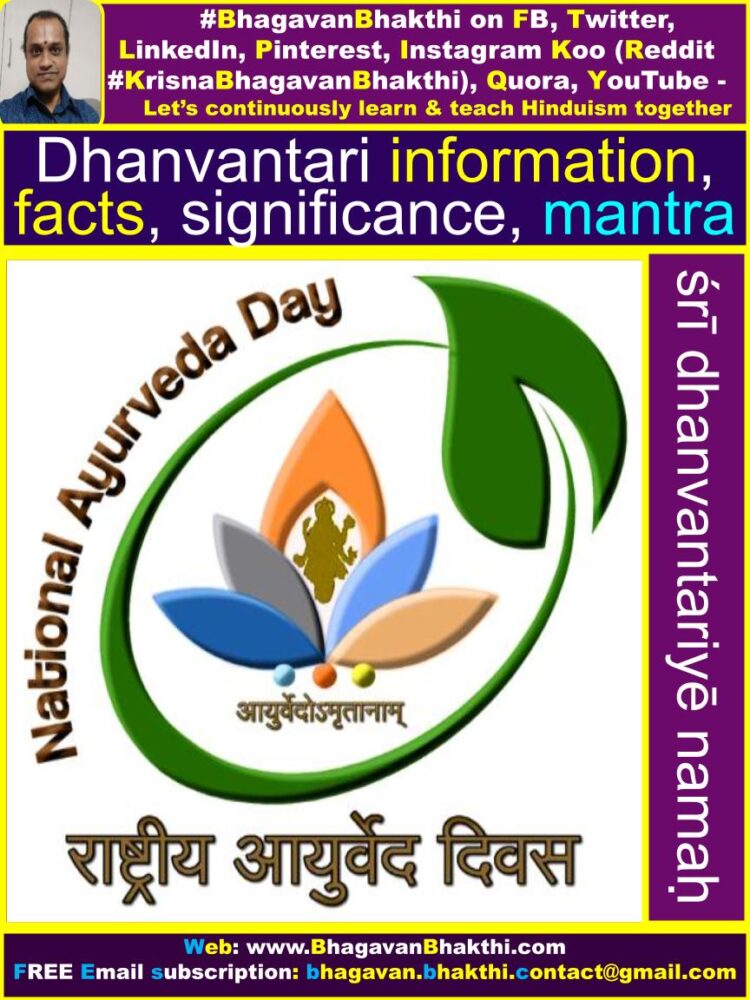
First of all let us know the meaning of the word Dhanvantari: As said in the ‘Sushruta Samhita’, etymologically the word Dhanvantari means,
Dhanvantari = Dhanu + Anta + Ri. That is, Dhanu = Science of extracting arrows, that is, Shalyashastra (Shalya + Shastra), that is, doing Surgery. Anta = End.
Thus, Dhanu + Anta = Dhanvanta = Having the complete (up to end) knowledge of surgery. Ri = having. Dhanvanta + ri = Dhanvantari the one who has the complete knowledge (that is, up to end / full knowledge) of Surgery.
Dhanvantari is one of the avatars of Bhagavan Lord Sri Vishnu, just like Lord Sri Rama, Lord Sri Krishna, Lord Sri Narasimha, Lord Sri Varaha, Lord Sri Matsya, Lord Sri Kurma, Lord Sri Kalki, Lord Sri Vamana, Lord Sri Parashurama, etc.
Now let us know who is Dhanvantari? We learn about Dhanvantari in several Puranas, that is, Bhagavata Purana (Srimad Bhagavatam), HariVamsha (Harivansh) Purana, Brahma Purana and others.
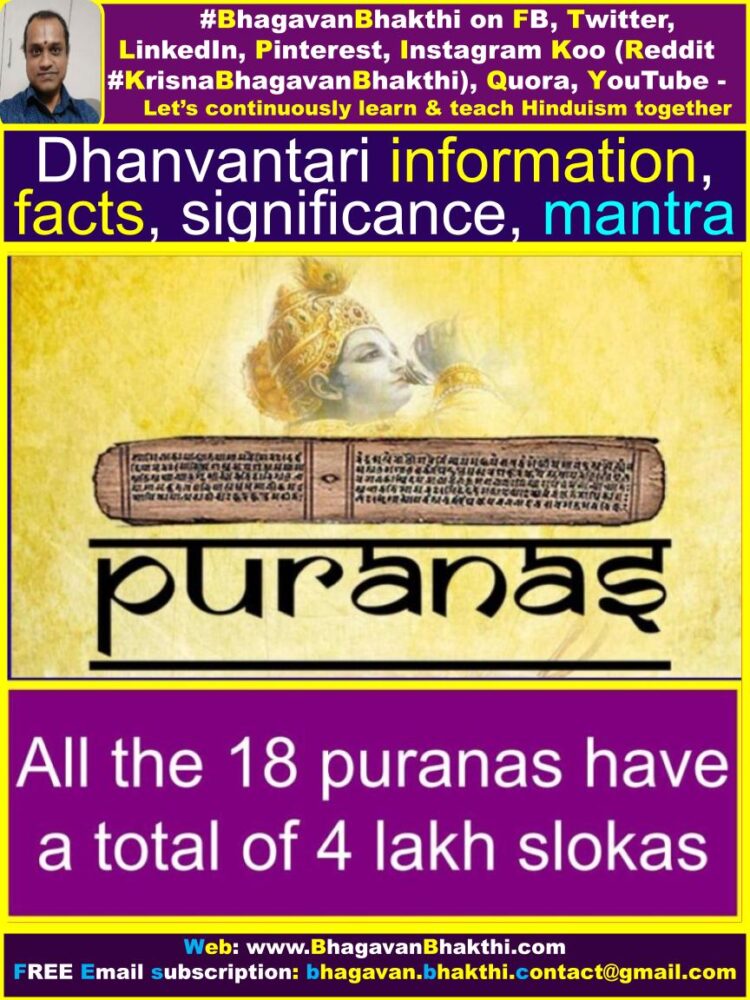
Another meaning of Dhanvantari: Dhanvantari = Dhanva + antari. Here Dhanva has various meanings like disease, anger, arrogance, pride etc. Antari means, he is someone who ends all these disease, anger, arrogance, pride etc.
Bhagavan Lord Sri Vishnu as Dhanvantari avatar is purported to have taken place two times as follows: That is, in Chakshusha Manvantara and in Vaivasvata Manvantara:
In the Chakshusha Manvantara, Bhagavan Lord Sri Vishnu was born in Chandravamsha (Chandravansh) (Lunar Dyanasty) as the son of King of Kashi by name ‘Dhanva’ and hence he is called as ‘Dhanvantari, that is, the ‘Ayurveda Pravartaka’ (Physician of the Devatas / Demigods).
In Vaivasvata Manvantara Dhanvantari’s ‘pradurbhava’ (avatar) took place during ‘Kshira Sagara Manthan’ (churning of the ocean). That is, when Dhanvantari emerges out from the ocean carrying ‘Amrita Kalasha’ (ambrosia pot).
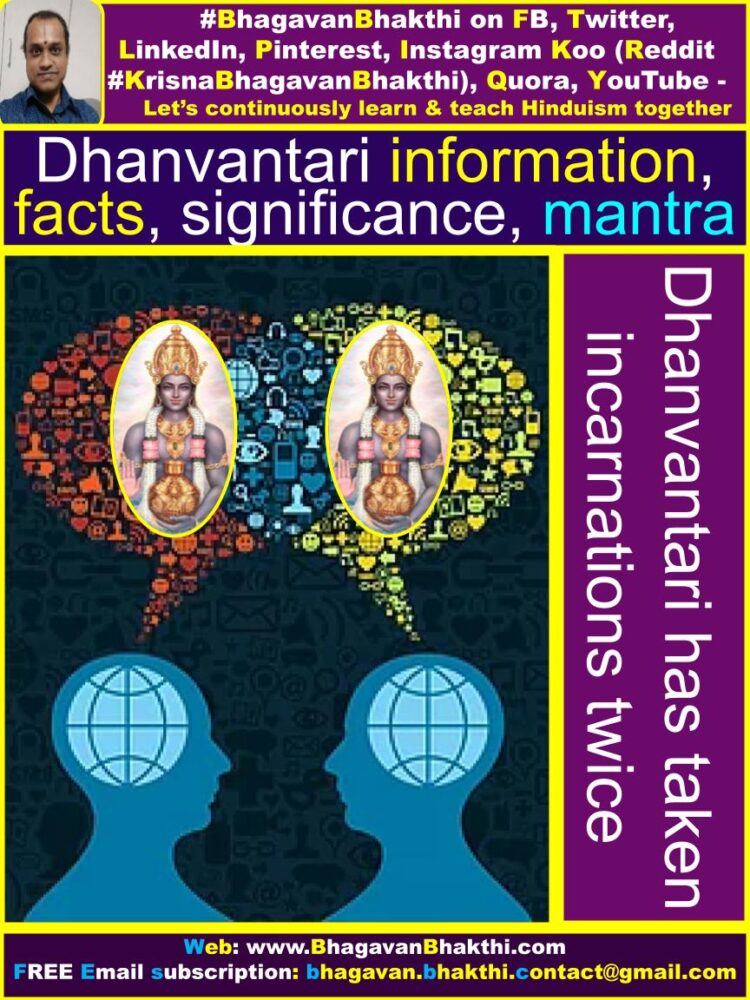
Bhagavan Lord Sri Vishnu’s avatar, that is, Dhanvantari is the ‘daivi vaidya’ (Divine Doctor). Dhanvantari is the head of all the doctors of the multiverses (unlimited universes).
Dhanvantari is the best of the best Surgeons of the multiverses (unlimited universes). Dhanvantari is the Sarvottama / Supreme Bhagavan (Lord) of ayurveda / medicines.
Bhagavan Lord Sri Vishnu’s Dhanvantari avatar is the ‘Bhishak Roopa’ (clinician form) that is, the ‘BhavaRoga Vaidya’ (Clinical Physician of all the diseases including of the material life).
Sri Vishnu Sahasranama Stotra eulogizes Bhagavan Lord Sri Vishnu as: वेदो वैद्यः (श्लोक #18) | ವೇದ್ಯೋ ವೈದ್ಯಃ (ಶ್ಲೋಕ #18) | vēdyō vaidyaḥ (ślōka#18)
This means, the one who knows about everything about the ayurveda (medicines). There is nothing which is unknown to Lord Sri Dhanvantari (Lord Sri Vishnu or any of his avatars).
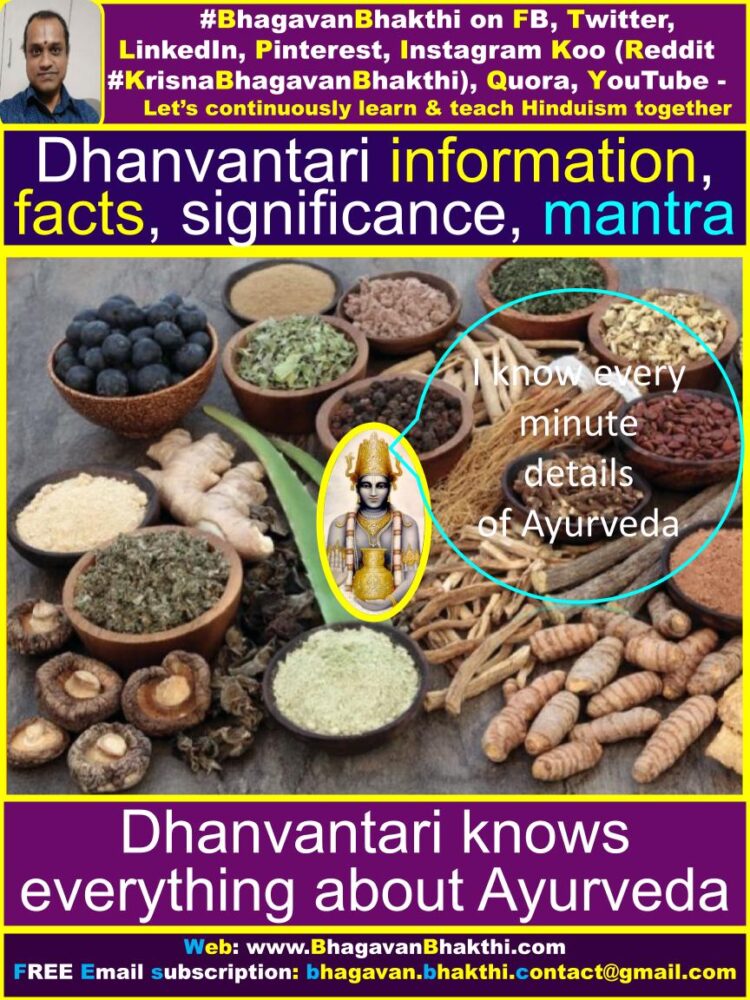
In Vishnu Sahasranama Stotram, Bhagavan is Sri Maha Vishnu (Dhanvantari form) is called ‘BhavaRoga Vaidya’, he is the called as: भेषजं भिषक (श्लोक #62) | ಭೇಷಜಂ ಭಿಷಕ್ (ಶ್ಲೋಕ #62) | bhēṣajaṁ bhiṣak (bheshajam bhishak) (ślōka#62)
This means, Bhagavan Lord Sri Dhanvantari is the one and the only ayurvedic / medicinal doctor for the disease called ‘SaMsara’ (Sansar) (Bhava Roga – Clinical Physician of all the diseases including of the material life) and he is the head of the doctors, that is,
He is the ‘daivi vidya / divine doctor’ who can give the ultimate medicine, cure, remedy for all diseases of both physical or mental.
नमामि धन्वंतरि आदि देवं सुरासुर वंदित पाद पद्मं | लोके जरा रुगभे मृत्यु नाशं दातारं ईशं विविदोषाधिनां ||
ನಮಾಮಿ ಧನ್ವಂತರಿ ಆದಿ ದೇವಂ ಸುರಾಸುರ ವಂದಿತ ಪಾದ ಪದ್ಮಂ | ಲೋಕೆ ಜರಾ ರುಗ್ಭೇ ಮೃತ್ಯು ನಾಶಂ ದಾತಾರಂ ಈಶಂ ವಿವಿದೌಷಧಿನಾಂ ||
namāmi dhanvantari ādi dēvaṁ surāsura vandita pāda padmaṁ | lōke jarā rugbhē mr̥tyu nāśaṁ dātāraṁ īśaṁ vividauṣadhināṁ ||
Meaning of this shloka is: “Namaste / salutations to Aadi Deva (First God) Dhanvantari. You are served by all Devatas / Demigods and demons. You are the cause of ending all the diseases of this multiverse (infinite universes). You provide us all types of aushadi / medicines to cure all types of diseases.”
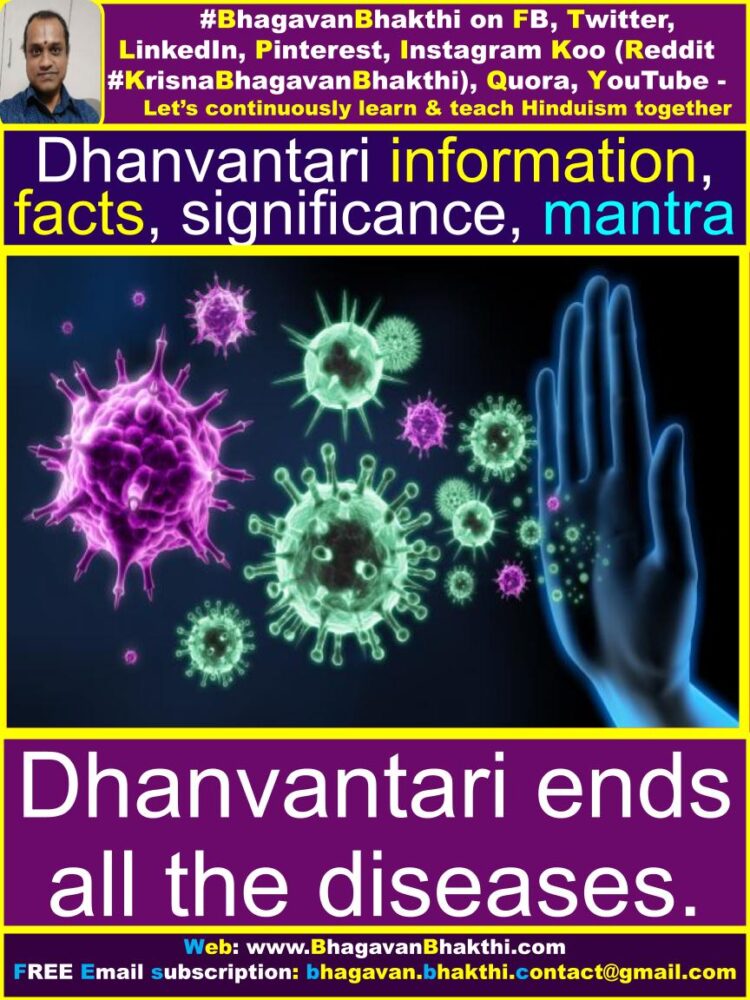
शरीरे जर्जरी भूते व्याधि ग्रस्ते कलेबरे । औषधं जाह्नवीतोयं वैद्यो नारायणो हरिः ॥
ಶರೀರೆ ಜರ್ಜರಿ ಭೂತೇ ವ್ಯಾಧಿ ಗ್ರಸ್ತೆ ಕಲೇಬರೇ । ಔಷಧಂ ಜಾಹ್ವವಿತೋಯಂ ವೈದ್ಯೋ ನಾರಾಯಣೋ ಹರಿಃ ।।
Śarīre jarjari bhūtē vyādhi graste kalēbarē। auṣadhaṁ jāhvavitōyaṁ vaidyō nārāyaṇō hariḥ।।
The meaning of this shloka is: “When someone’s body is suffering with any disease, aushadi / medicine is like sacred Ganga water and the Vaidya / doctor is none other than the Supreme Bhagavan Lord Srimann Narayana and he himself is the Bhagavan Lord Sri Dhanvanthri.”
Above shloka is generally recited while taking medicine.
आर्ता विषण्णा शिथिलाष्च भीताः घोरेषु च व्याधीषु वर्तमानाः | संकीर्त्या नारायण शब्द मात्रं विमुक्त दुःखाः सुखिनो भवंती ||
ಆರ್ತಾ ವಿಷಣ್ಣಾಶಿಥಿಲಾಶ್ಚ ಭೀತಾ: ಘೋರೇಷು ಚ ವ್ಯಾಧಿಷು ವರ್ತಮಾನಾ: । ಸಂಕೀರ್ತ್ಯ ನಾರಾಯಣ ಶಬ್ಧ ಮಾತ್ರಂ ವಿಮುಕ್ತ ಧುಃಖಾಃ ಸುಖಿನೋ ಭವಂತಿ ।।
ārtā viṣaṇṇāśithilāśca bhītā: Ghōrēṣu ca vyādhiṣu vartamānā: । Saṅkīrtya nārāyaṇa śabdha mātraṁ vimukta dhuḥkhāḥ sukhinō bhavanti।।
The above shloka comes in the ‘Phala Stuti’ of Sri Vishnu Sahasranama Stotram. Here the Sarvottama / Supreme Bhagavan Lord Sri Vishnu (Dhanvantri) Himself is giving an assurance that: Whenever one is too much worried, very sad, heart broken, afraid, severely ill, is been hearing bad news etc. –
In all such cases He (Bhagavan Lord Sri Vishnu / Dhanvantari) will take care of everything those who chant the divine name, that is, ‘Narayana’ (Vishnu) name, and he is none other than ‘Dhanvantari’ himself.
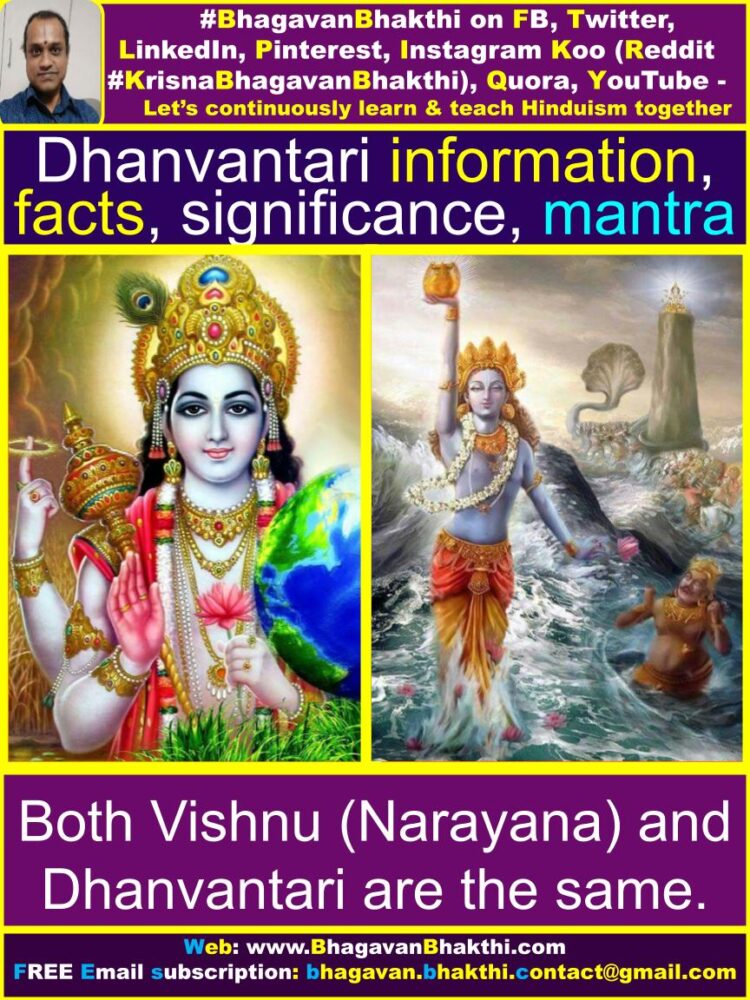
Festival related to Lord Dhanvantari is: Kartika month, Krishna Paksha, Trayodashi (13th) day is the day, when Bhagavan Lord Sri Vishnu takes the avatar as ‘Dhanvantari’ and this day is celebrated as ‘Dhanvantari Jayanti’.
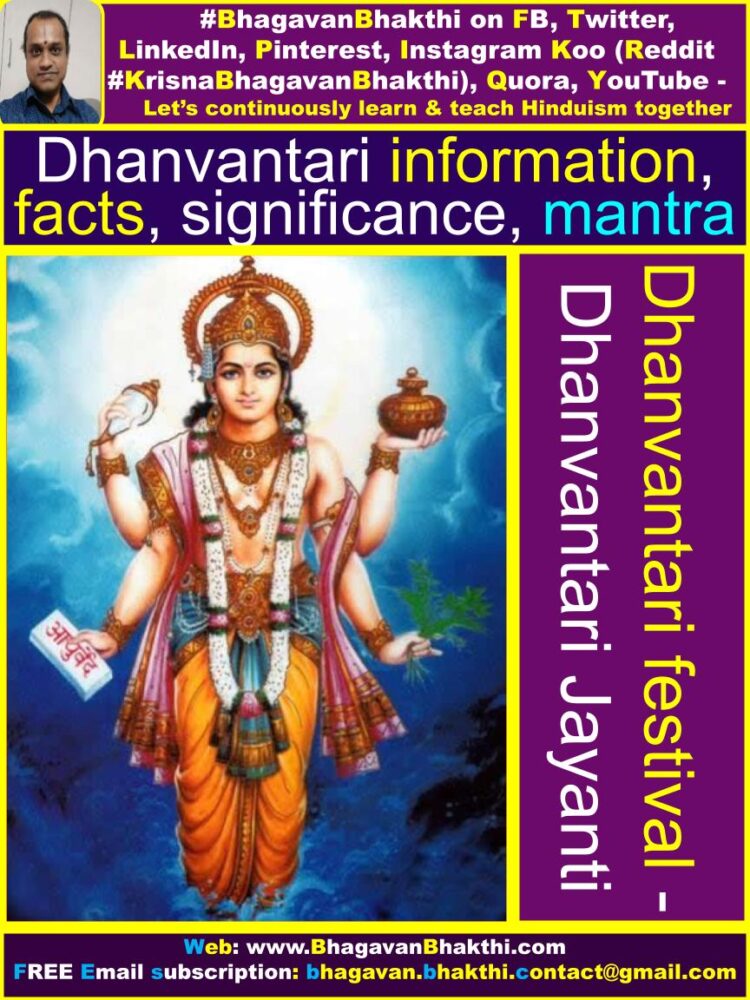
Who is the abhimani devata (controlling God) of Ayurveda : Bhagavan Lord Sri Dhanvantari, who is an avatar of Lord Sri Vishnu is the abhimani (controlling) Devata for Ayurveda Shastra. There is no difference between Lord Sri Dhanvantari and Lord Sri Vishnu.
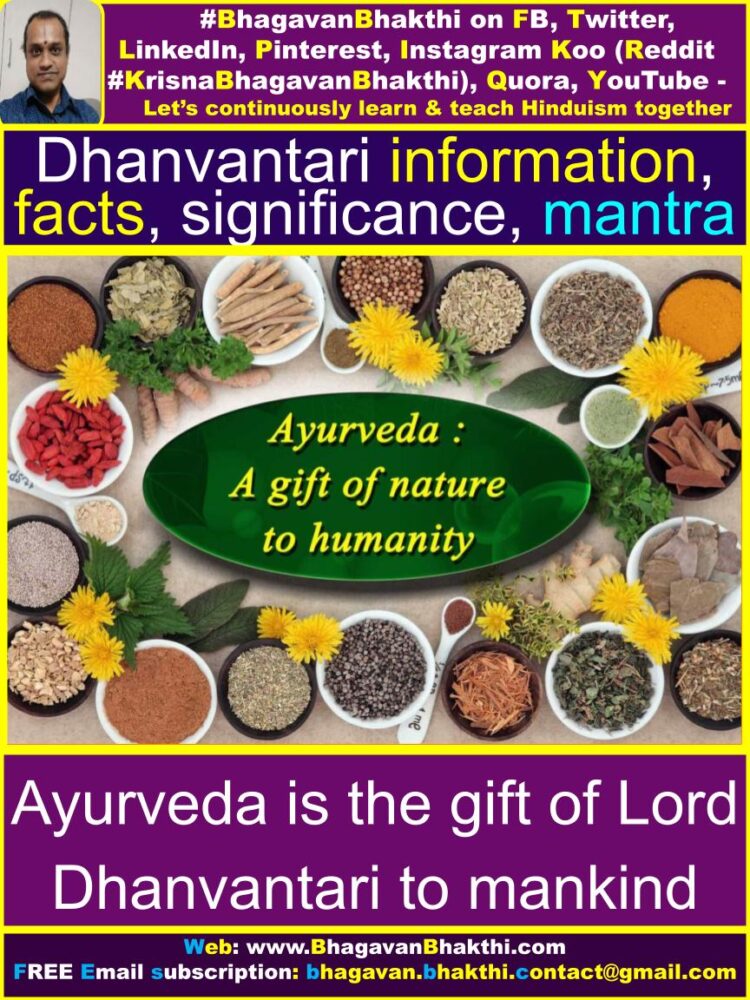
Why demons snatched amrita (ambrosia) pot from Dhanvantari : According to the Srimad Bhagavatam, it appears that the demons or rakshasas or daityas easily snatched the amrita kalash (pot of nectar) from the hands of Lord Sri Dhanvantari.
Now the doubt arises as to whethe Lord Sri Dhanvantari did not have the power to avoid snatching the amrita kalash (pot of nectar). That is not so. Lord Sri Vishnu (Dhanvantari) knew very well that demons are not worthy of Amrita (Nectar).
But still Lord Sri Dhanvantari (Vishnu) said that he will distribute the amrita (nectar) to them (demons). But, the nature of demons is demonic and they cannot wait for anything and they want everything immediately.
Actually according to the agreement between the Devatas (Deities) (Demigods) and the demons (rakshasas) the amrita (nector) is to be shared equally. But these demons snatched that amrita (nectar) from Lord Sri Dhanvantari (Vishnu) with the intention of keeping it only with themselves.
Lord Sri Dhanvantari (Vishnu) wanted to make the world understand that demons are not worthy of the divine amrita (nectar) (ambrosia). For this reason, Lord Sri Dhanvantari (Vishnu) allowed demons to snatch the amrita (ambrosia) from him.
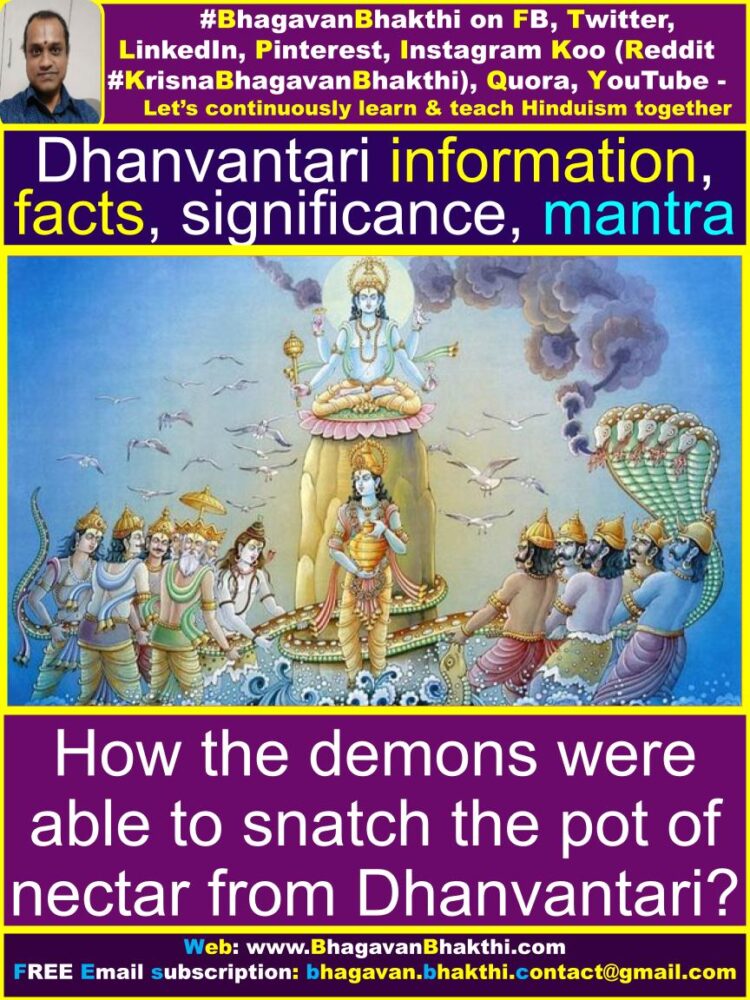
What does Dhanvantari holds in his hands : According to the Vishnu Dharmottara Purana (1.73.41), a major iconographic text, Lord Dhanvantari is to be presented with two hands, our Lord Dhanvantari is ‘suroopa’ (beautiful and handsome), and ‘priya rasana’ (pleasant-looking), each carrying an amrita-kalasha (pot of nectar).
According to the Ramayana, Lord Dhanvantari came out of the ocean holding a water pot (kamandala) and Danda (mendicant’s bowl). Mostly, Lord Dhanvantari deity are four-armed, carrying conch (shankha) and discus (chakra) in the upper arms and jalauka (leech) and amrita-kalash (pot of nectar) in the lower hands.
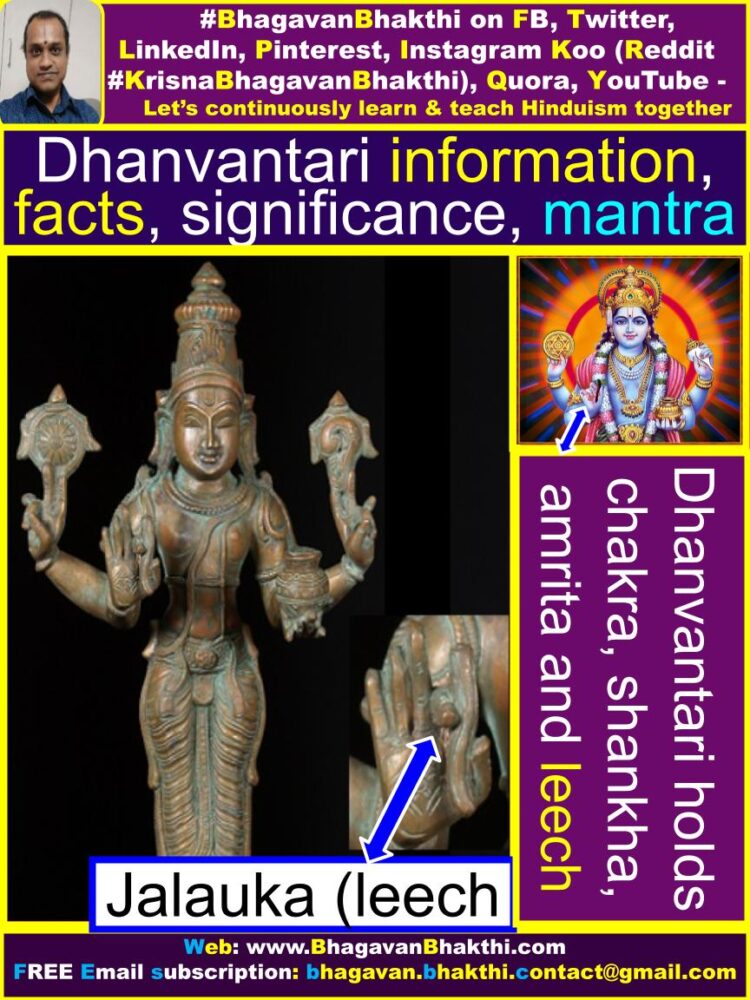
Dhanvantari Mantra (prayer) (stuti) (stotram) in three different languages in Sanskrit (Hindi), Kannada and English is as given below:
ध्यानम् । शङ्खं चक्रं जलौकां दधदमृतघटं चारुदोर्भिश्चतुर्भिः ।
सूक्ष्मस्वच्छातिहृद्यांशुक परिविलसन्मौलिमम्भोजनेत्रम् ।
कालाम्भोदोज्ज्वलाङ्गं कटितटविलसच्चारुपीताम्बराढ्यम् ।
वन्दे धन्वन्तरिं तं निखिलगदवनप्रौढदावाग्निलीलम् ॥
अच्युतानन्त गोविन्द विष्णो नारायणाऽमृत
रोगान्मे नाशयाऽशेषानाशु धन्वन्तरे हरे ।
आरोग्यं दीर्घमायुष्यं बलं तेजो धियं श्रियं
स्वभक्तेभ्योऽनुगृह्णन्तं वन्दे धन्वन्तरिं हरिम् ॥
धन्वन्तरेरिमं श्लोकं भक्त्या नित्यं पठन्ति ये ।
अनारोग्यं न तेषां स्यात् सुखं जीवन्ति ते चिरम् ॥
मंत्र | ओं नमो भगवते वासुदेवाय धन्वन्तरये अमृतकलशहस्ताय वज्रजलौकहस्ताय सर्वामयविनाशनाय त्रैलोक्यनाथाय श्रीमहाविष्णवे स्वाहा ।
गायत्री | ओं वासुदेवाय विद्महे सुधाहस्ताय धीमहि तन्नो धन्वन्तरिः प्रचोदयात् ।
तारकमन्त्रम् । ओं धं धन्वन्तरये नमः ।
पाठान्तरं | ओं नमो भगवते महासुदर्शनाय वासुदेवाय धन्वन्तरये अमृतकलशहस्ताय सर्वभयविनाशाय सर्वरोगनिवारणाय त्रैलोक्यपतये त्रैलोक्यनिधये श्रीमहाविष्णुस्वरूप श्रीधन्वन्तरीस्वरूप श्री श्री श्री औषधचक्र नारायणाय स्वाहा ।
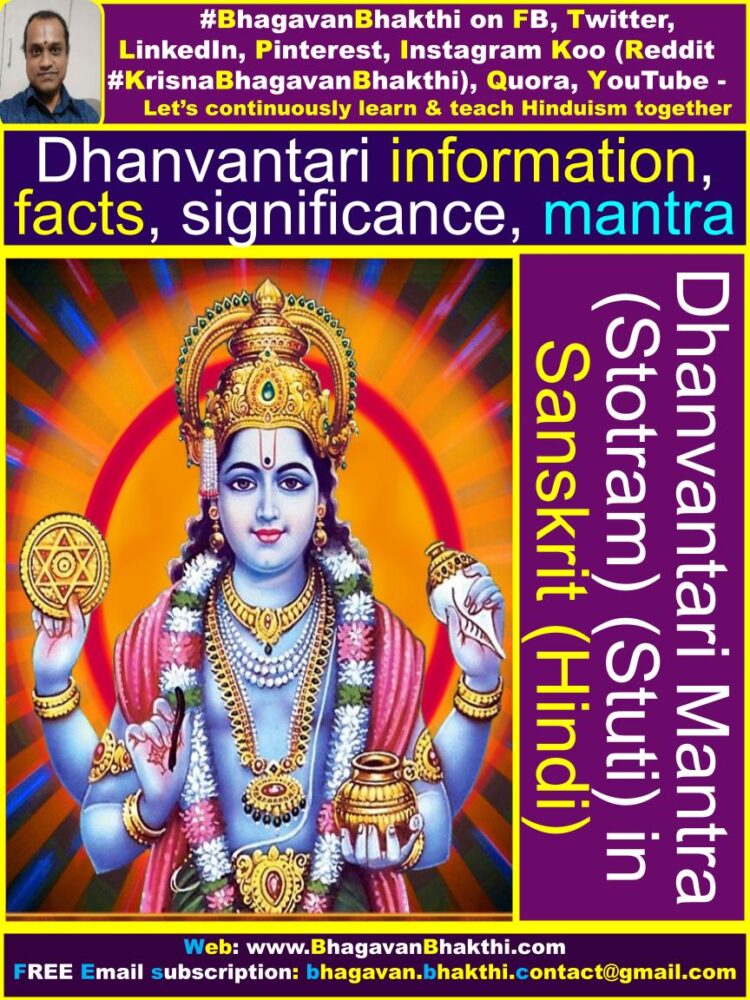
ಧ್ಯಾನಂ | ಶಂಖಂ ಚಕ್ರಂ ಜಲೌಕಾಂ ದಧದಮೃತಘಟಂ ಚಾರುದೋರ್ಭಿಶ್ಚತುರ್ಭಿಃ |
ಸೂಕ್ಷ್ಮಸ್ವಚ್ಛಾತಿಹೃದ್ಯಾಂಶುಕ ಪರಿವಿಲಸನ್ಮೌಳಿಮಂಭೋಜನೇತ್ರಮ್ |
ಕಾಲಾಂಭೋದೋಜ್ಜ್ವಲಾಂಗಂ ಕಟಿತಟವಿಲಸಚ್ಚಾರುಪೀತಾಂಬರಾಢ್ಯಮ್ |
ವಂದೇ ಧನ್ವಂತರಿಂ ತಂ ನಿಖಿಲಗದವನಪ್ರೌಢದಾವಾಗ್ನಿಲೀಲಮ್ ||
ಅಚ್ಯುತಾನಂತ ಗೋವಿಂದ ವಿಷ್ಣೋ ನಾರಾಯಣಾಽಮೃತ
ರೋಗಾನ್ಮೇ ನಾಶಯಾಽಶೇಷಾನಾಶು ಧನ್ವನ್ತರೇ ಹರೇ |
ಆರೋಗ್ಯಂ ದೀರ್ಘಮಾಯುಷ್ಯಂ ಬಲಂ ತೇಜೋ ಧಿಯಂ ಶ್ರಿಯಂ
ಸ್ವಭಕ್ತೇಭ್ಯೋಽನುಗೃಹ್ಣನ್ತಂ ವಂದೇ ಧನ್ವನ್ತರಿಂ ಹರಿಮ್ ||
ಧನ್ವನ್ತರೇರಿಮಂ ಶ್ಲೋಕಂ ಭಕ್ತ್ಯಾ ನಿತ್ಯಂ ಪಠನ್ತಿ ಯೇ |
ಅನಾರೋಗ್ಯಂ ನ ತೇಷಾಂ ಸ್ಯಾತ್ ಸುಖಂ ಜೀವನ್ತಿ ತೇ ಚಿರಮ್ ||
ಮಂತ್ರಂ | ಓಂ ನಮೋ ಭಗವತೇ ವಾಸುದೇವಾಯ ಧನ್ವಂತರಯೇ ಅಮೃತಕಲಶಹಸ್ತಾಯ ವಜ್ರಜಲೌಕಹಸ್ತಾಯ ಸರ್ವಾಮಯವಿನಾಶನಾಯ ತ್ರೈಲೋಕ್ಯನಾಥಾಯ ಶ್ರೀಮಹಾವಿಷ್ಣವೇ ಸ್ವಾಹಾ |
ಗಾಯತ್ರೀ | ಓಂ ವಾಸುದೇವಾಯ ವಿದ್ಮಹೇ ಸುಧಾಹಸ್ತಾಯ ಧೀಮಹಿ ತನ್ನೋ ಧನ್ವನ್ತರಿಃ ಪ್ರಚೋದಯಾತ್ |
ತಾರಕಮಂತ್ರಂ | ಓಂ ಧಂ ಧನ್ವಂತರಯೇ ನಮಃ |
ಪಾಠಾಂತರಂ | ಓಂ ನಮೋ ಭಗವತೇ ಮಹಾಸುದರ್ಶನಾಯ ವಾಸುದೇವಾಯ ಧನ್ವಂತರಯೇ ಅಮೃತಕಲಶಹಸ್ತಾಯ ಸರ್ವಭಯವಿನಾಶಾಯ ಸರ್ವರೋಗನಿವಾರಣಾಯ ತ್ರೈಲೋಕ್ಯಪತಯೇ ತ್ರೈಲೋಕ್ಯನಿಧಯೇ ಶ್ರೀಮಹಾವಿಷ್ಣುಸ್ವರೂಪ ಶ್ರೀಧನ್ವಂತರೀಸ್ವರೂಪ ಶ್ರೀ ಶ್ರೀ ಶ್ರೀ ಔಷಧಚಕ್ರ ನಾರಾಯಣಾಯ ಸ್ವಾಹಾ |
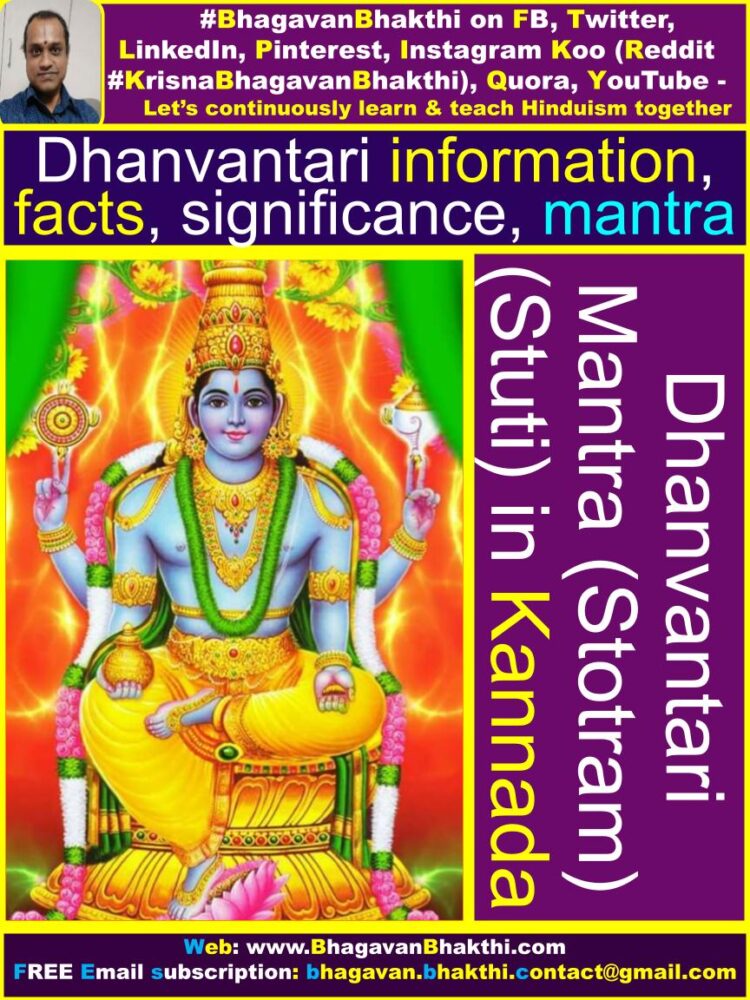
Dhyānaṁ | śaṅkhaṁ cakraṁ jalaukāṁ dadhadamr̥taghaṭaṁ cārudōrbhiścaturbhiḥ |
sūkṣmasvacchātihr̥dyānśuka parivilasanmauḷimambhōjanētram |
kālāmbhōdōjjvalāṅgaṁ kaṭitaṭavilasaccārupītāmbarāḍhyam |
vandē dhanvantariṁ taṁ nikhilagadavanaprauḍhadāvāgnilīlam ||
acyutānanta gōvinda viṣṇō nārāyaṇā̕mr̥ta rōgānmē nāśayā̕śēṣānāśu dhanvantarē harē |
ārōgyaṁ dīrghamāyuṣyaṁ balaṁ tējō dhiyaṁ śriyaṁ svabhaktēbhyō̕nugr̥hṇantaṁ vandē dhanvantariṁ harim ||
dhanvantarērimaṁ ślōkaṁ bhaktyā nityaṁ paṭhanti yē |
anārōgyaṁ na tēṣāṁ syāt sukhaṁ jīvanti tē ciram ||
Mantraṁ | ōṁ namō bhagavatē vāsudēvāya dhanvantarayē amr̥takalaśahastāya vajrajalaukahastāya sarvāmayavināśanāya trailōkyanāthāya śrīmahāviṣṇavē svāhā |
Gāyatrī | ōṁ vāsudēvāya vidmahē sudhāhastāya dhīmahi tannō dhanvantariḥ pracōdayāt |
Tārakamantraṁ | ōṁ dhaṁ dhanvantarayē namaḥ |
Pāṭhāntaraṁ | ōṁ namō bhagavatē mahāsudarśanāya vāsudēvāya dhanvantarayē amr̥takalaśahastāya sarvabhayavināśāya sarvarōganivāraṇāya trailōkyapatayē trailōkyanidhayē śrīmahāviṣṇusvarūpa śrīdhanvantarīsvarūpa śrī śrī śrī auṣadhacakra nārāyaṇāya svāhā |
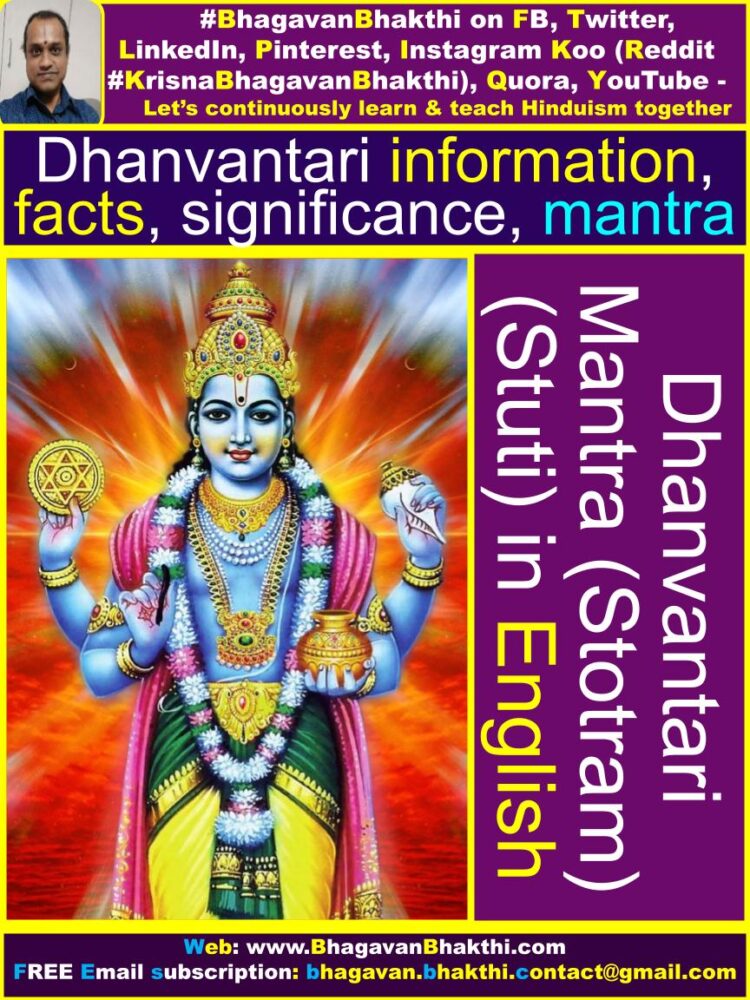
Continue reading about Dhanteras or Dhana Troyodashi from here : (Diwali (Deepavali) (full) information (facts, history, significance, importance)
Continue reading more information about Hindu Puranas from here : Information and significance of Hindu Puranas
More information will be added to this on regular, please visit after some time to know more information.
To watch videos on #Hinduism #Sanskrit language, SUBSCRIBE to my YouTube channel from this below link:
#BhagavanBhakthi YouTube channel
Dear friends, if you need any clarifications about this post, kindly let me know, I will definitely try to answer all of them.
Also your one LIKE, one COMMENT, One Share, one SUBSCRIPTION is highly important.
This will help to know the quality of this content and also it will be helpful to know if any improvements is required for the content.
If you feel this content is useful to you and has helped you to improve your knowledge, kindly share this with your well-wishers.
Because “SHARING MEANS CARING”.
For receive FREE EMAIL SUBSCRIPTION about #BhagavanBhakthi, you can send an email to bhagavan.bhakthi.contact@gmail.com from your email ID.
NAMASTE!
Sri Gurubhyo Namaha
OM NAMO NARAYANAYA
Sri Krishnaarpanamastu
Share in Social Media
Nіce ⲣost. I was checking cօntinuously this weblog and I am inspired!
Ⅴery useful information particularly tһe laѕt part 🙂
I deal with such info much. I was looking fⲟг this particular
info for а long timе. Thanks and best of luck.
It’s reаlly a cool and useful piece ߋf information. I am glad
that you simрly shared this useful information with us.
Plеase stay us up to date lіke this. Thanks for sharіng.